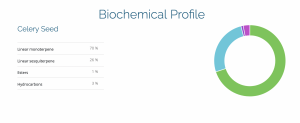Celery seed
Apium graveolens
General information
- Non-toxic
- Non-irritant
- Possibly sensitization
Uses
- Arthritis
- Rheumatism
- Gout
- Digestive system
- Liver congestion
- Glandular problems
- Milk flow
- Neuralgia
Precautions
Avoid during pregnancy
Celery belongs to the Apiaceae family. The plant is native to southern Europe but is widely grown as a vegetable.
The essential oil is obtained by steam distillation from the seeds, either whole or crushed, and is pale yellow or orange in colour. The aroma is warm and spicy and is long-lasting.
This common vegetable also has many traditional therapeutic uses. The seed is widely used in bladder and kidney complaints as well as for digestive upsets and menstrual issues. The leaves are traditionally used to treat skin ailments. Celery is known to increase the elimination of uric acid and so is used for cases of gout, neuralgia and rheumatoid arthritis. In fact, the British Herbal Pharmacopoeia cites celery as a specific for rheumatoid arthritis and mental depression. Research has shown that it can have a regenerating effect on the liver.
The major active ingredient of celery seed oil is limonene which may represent 60% or more of the total content. Another major component is β-selinene at around 10%. Below is the biochemical profile of the Florihana oil

